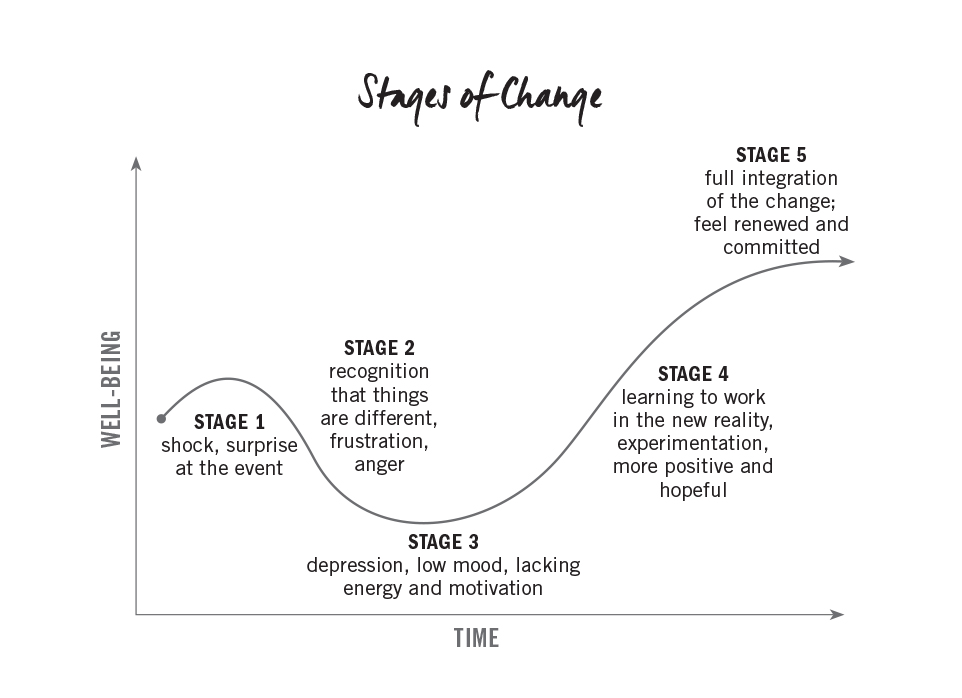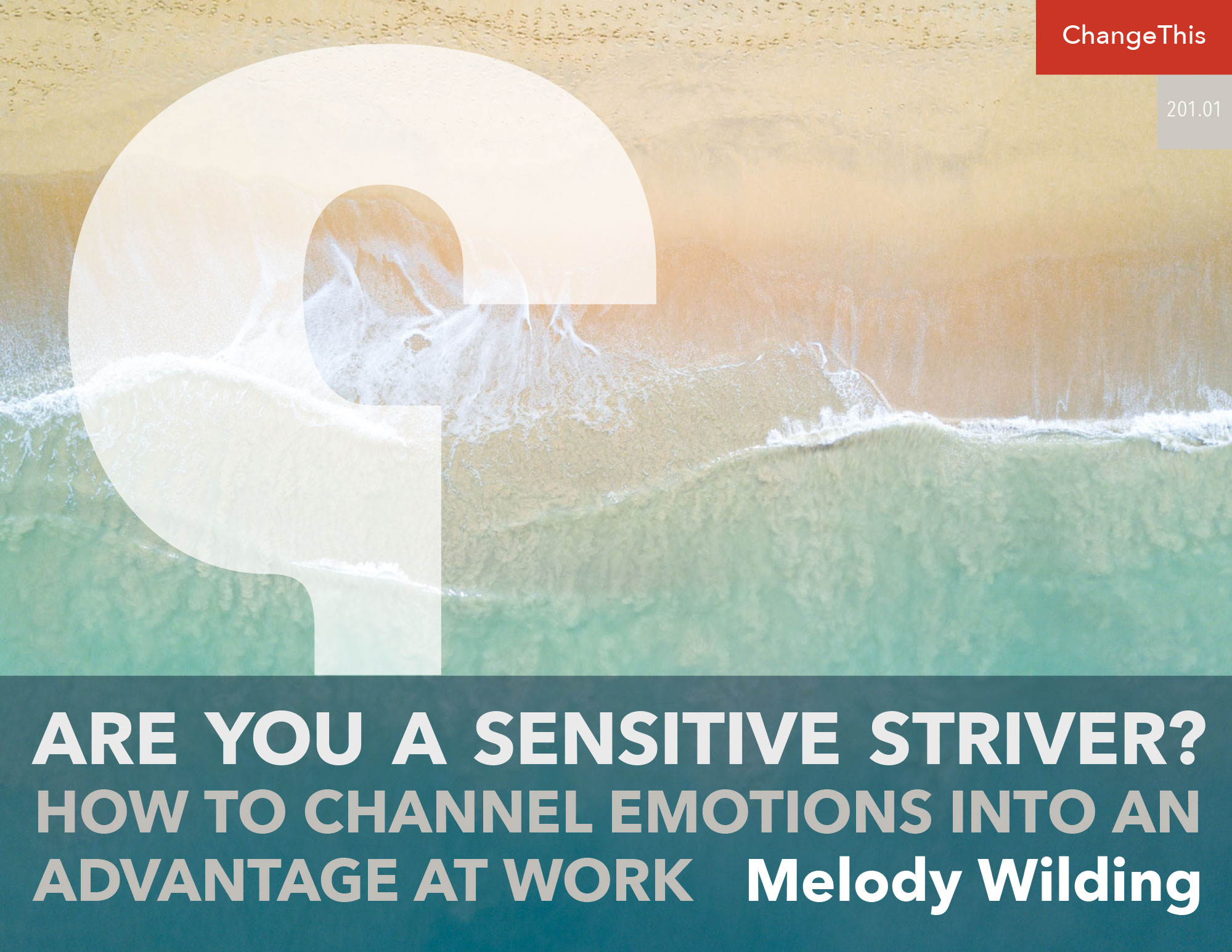Are You a Sensitive Striver? How to Channel Emotions into an Advantage at Work
It hit me like a ton of bricks one Saturday night. Sitting at a halfempty Starbucks on the Upper East Side, I realized I had made a terrible mistake.
For months, I had looked forward to a close friend’s wedding weekend. My hotel was paid for. Travel arrangements had been made. I couldn’t wait to celebrate the bride and to see all of my college friends in one place. But, in the week leading up to the wedding, new projects piled up at work, and I felt enormous pressure—both internal and external— to be available and responsive 24/7. I couldn’t stop obsessing about my never-ending to-do list, I found myself feeling guilty about taking time off, and I agonized about whether or not I should actually go. One part of me craved time away filled with fun, laughter, and relaxation while another reminded me how behind I felt and how much I could get done if I stayed home. At the last minute, I bailed. Sure, I was making the right decision for my career, but that Saturday, while my friends celebrated together, I was alone with my laptop, swimming in regret.
All my life, I had been a classic A-plus, gold-star, good girl who lived to exceed expectations. Diligent and disciplined, I worked hard to earn high grades in school, graduated at the top of my college class while balancing multiple jobs, and went on to get a master’s in social work from Columbia University, so I could work in mental health. I dreamed of becoming a therapist, until well-meaning loved ones and advisors cautioned against it. You can’t make money as a therapist. You should go into healthcare or technology—something more stable and lucrative. I followed their advice and took a job as a researcher at a fast-paced healthcare center in Manhattan.
From the outside, it looked like I had it all. I was accomplished, lived in a big city, and had a clear career path. But on the inside, I was frazzled, restless, and depleted. Rather than seeing my psychological state for what it was—a sign that my habits and behaviors were unsustainable—I took my sadness and disappointment to heart. Everyone else seemed so together. What was wrong with me?
Though I had no way of knowing it then, I wasn’t alone when it came to how I felt. Sensitive, ambitious people are often so worried about what others think and so influenced by common definitions of success that they don’t know how to direct their energy toward what they really want—a fulfilling life coupled with a sense of confidence and control. They’ve been taught that achievement means climbing to the top of the career ladder, but even when they do, they often feel empty, or experience relentless pressure to accomplish even more. And when this leads to burnout, these individuals assume the problem lies with them, instead of considering that, perhaps, they need to approach their careers (and their relationships with themselves) in a new way.
Looking back, my decision to skip the wedding made zero sense, but in retrospect I’m glad I made that terrible choice. That summer night forced me to step back and take a hard look at the feelings, thoughts, and behaviors that had brought me to this point. In addition to my research job, I had slowly been building a coaching practice during the previous three years based on my training in psychology; now I had no choice but use the tools I had used with my clients on myself. When I began to unravel my self-sabotaging habits, I realized that the crux of the problem went deeper than just managing my time and the logistics of my full-time job and the business I was trying to build. The issue was an internal one: I had ignored my well-being and personal goals in favor of pursuing what I assumed I should be doing without ever pausing to consider if it would actually be fulfilling to me.
It took years of work for me to gradually free up the mental and emotional bandwidth to admit that my job wasn’t aligned with what I needed and wanted as a hardworking but also naturally sensitive person. More importantly, through my coaching work, I discovered many sensitive high achievers like me who were struggling with problems like overthinking, emotional reactivity, perfectionism, and poor boundaries.
Over time, I realized I wanted to help this particular group, who I call Sensitive Strivers, harness the power of their built-in sensitivities, which eventually led to me leaving my career in healthcare and expanding my coaching practice.
You might be burned out like I was and facing down the realization that your work habits aren’t sustainable. You may have recently been pro-moted, landed a new job, or have another opportunity that’s leading you to think, This is my moment! Naturally, you want to bring your best to the situation—to get to the next level career-wise and to continue growing as a human being. You may be excited but worried about your ability to handle the workload and pressure. Or maybe you’re facing factors out-side your control or overall uncertainty in your career and, as a Sensitive Striver, you want to get better at rebounding from setbacks when and if they come.
Whatever the circumstance, you likely want how you feel on the inside to match the image of success you portray on the outside. Because most of all, you’re probably sick and tired of getting in your own way.
You want to understand and move past your insecurities so that you can . . .
- Drop the mental gymnastics of self-doubt, worry, and fear that limit your potential
- Enjoy your success without sacrificing your well-being or what’s most important to you
- Feel secure in your judgment without a sneaking sense of doubt
I’m also willing to bet that you are looking for hope—hope that you can change, hope that you can develop steadfast belief in yourself that isn’t contingent on how productive you are, hope that you’re not crazy for being so affected by everything around you. Let me assure you that you are not alone. There are thousands, if not millions, of other sensitive, driven women and men out there who have wrestled with inadequacy and are thriving because they’ve learned how to channel their qualities in constructive ways.
ARE YOU A SENSITIVE STRIVER?
“I understand now that I’m not a mess, but a deeply feeling person in a messy world. I explain that now, when someone asks me why I cry so often: ‘For the same reason I laugh so often—because I’m paying attention.’” —GLENNON DOYLE
Sensitive Strivers are high achievers who are also more attuned to their emotions, the world, and the behavior of those around them. Many are former star students who bring that same dedication, reliability, and ambition into the workplace. But while many Sensitive Strivers rise quickly in their careers, they often face a daily battle with stress, anxiety, and self-doubt. If all of this resonates with you, then welcome. You’re in exactly the right place. This mix of qualities makes you who you are, and likely has made you super successful.
On the one hand, people appreciate your warmth, depth of personality, and overall conscientiousness. On the other hand, situations that others find relatively easy, such as making decisions and recovering from setbacks, can send you into a downward spiral. As a Sensitive Striver, you may sometimes feel demoralized by the high expectations you place on yourself, which can lead to overthinking minor situations. You may also be prone to emotional overwhelm that shows up in the form of tears, panic, or complete withdrawal. That’s because when sensitivity and achievement meet, it can be a tricky combination. Recently on Instagram, one of my followers summed up what it’s like by saying, “I overeverything.”
WHAT BEING A SENSITIVE STRIVER IS NOT
You may be thinking to yourself that sensitive striving is just another form of being a perfectionist, an overachiever, or an introvert. While being a Sensitive Striver may overlap with one or more of the other categories, none of them adequately captures the struggles Sensitive Strivers face. For instance:
- Not all sensitive people are introverted. Sensitive people and introverts share many qualities, such as a need for more downtime, but research shows that about 30 percent of sensitive people are extroverted, mean-ing they gain energy by being around people. Many introverts also do not consider a strong work ethic as a core part of their identities like Sensitive Strivers do.
- Not all perfectionists are self-aware or accomplished in their careers. In fact, the most successful people are rarely perfectionists (defined as a striving for flawlessness and setting high performance standards) because perfectionism cripples progress and leads to decision paralysis.
- Not all overachievers are sensitive. You can be an overachiever (defined as someone who performs better or achieves more success than expected) without experiencing the higher-than-normal reactivity that comes with being sensitive. Not all high performers experience challenges when encountering conflict, setting boundaries, or quieting negative thoughts like Sensitive Strivers do.
STRATEGY: KNOW YOURSELF
Sensitive striving has many variations, but it shows up most often as one of six core qualities that form the acronym STRIVE. You may easily recognize yourself in some of these descriptions while some of the others might not feel as familiar or relevant. That’s okay. The STRIVE qualities exist on a spectrum like any other trait.
Sensitivity. Processing complex information comes naturally to you because you’re perceptive and have a heightened response to what’s happening within and around you. You thrive best with structure and routine. Without it, you get easily overstimulated, especially if you’re under pressure (both real and imagined).
Thoughtfulness. You’re highly self-aware, reflective, and intuitive. Your ability to see nuance and to synthesize information makes you especially original and creative. On the flip side, your brain is often racing. It’s not uncommon for you to overanalyze day-to-day experiences, and your above-average self-awareness can veer into self-consciousness and self-criticism.
Responsibility. You’re dependable and people trust you and look to you for support. Hardworking (perhaps to a fault), you can’t bear to let people down, even if it entails sacrifice. A never-ending desire to be liked and to please others is exhausting, contributing to burnout.
Inner Drive. Sensitive Strivers live to exceed expectations, not only on performance reviews, but in every aspect of life. You devote substantial energy to your career and care deeply about making an impact. Nothing makes you more excited than hitting goals or knocking items off your (very long) to-do list, but you often set an unrealistically high bar for success.
Vigilance. You are keenly attuned to changes and tend to be aware of subtleties in your environment, from your boss’s body language to the general mood of a meeting. You listen well and try to be responsive to people’s needs. Being on high alert can be draining, however, and you may sometimes perceive danger or a threat where there is none.
Emotionality. Sincere and empathetic, you feel things in a big way and have complex emotional responses. You’re able to experience the richness of positive emotions like inspiration and gratitude, but can also get stuck in unpleasant feelings like annoyance and disappointment.
While it may seem counterintuitive, these qualities, when taken to an extreme, can actually become a liability. For example, it’s great to be detail-oriented, but if you need to read every email ten times before hitting send, your productivity may unwittingly grind to a halt. If you’re loyal and caring to an extreme, then personality differences that naturally arise on teams can derail you or prevent you from having boundaries that protect your well-being. That’s why it’s so important to know yourself, to see how the STRIVE qualities impact your life, and to begin to rebalance any qualities you may be overusing.
GET UNSTUCK
1. PRACTICE SEEING YOUR ACTIONS THROUGH THE STRIVE LENS. If you have trouble rating yourself at first, don’t worry. As you go about your business over the next few days, notice tasks and situations you approach with confidence versus those you struggle with. Then ask yourself what STRIVE qualities are at play in either scenario.
2. BUILD A SUPPORTIVE COMMUNITY. What was once an invisible trait can now be a helpful framework for others to understand you better. Tell your family, close friends, and trusted coworkers that you’re a Sensitive Striver and introduce them to the STRIVE qualities. Support is crucial, and these conversations can provide valuable insight about how your STRIVE qualities are balanced or unbalanced. You may also discover that others are Sensitive Strivers, too.
3. FOCUS ON WHAT’S WORKING. The traditional approach to problem-solving is to focus on the negative and to try and fix what’s wrong. Instead, tune into when you are your best possible self and remind yourself how and why your STRIVE qualities are an asset.
SUSTAINING SELF-GROWTH
It’s important to mention that at some point you may feel like you’re not getting anywhere, or that you were making a lot of progress, but now you’re stalled. You could also be thrust into difficult situations that are beyond your control, like the global COVID-19 pandemic. When you’re learning to trust yourself, it’s scientifically proven that you will hit low points. Not only is this okay, it’s normal, because of the phenomenon of the change curve. You may be familiar with this idea from management or business training, but it applies to your development as a Sensitive Striver, too.
On the vertical axis is well-being (motivation, happiness, productivity, etc.), and the other axis represents time. As you begin to transform yourself, you may find your motivation temporarily drops. Why? Change is hard! Plus, your energy is a fluctuating resource, and the fact is that things will happen that rock your confidence, enthusiasm, and focus. Anything worth doing comes with a plunge where doubt and confusion set in, and nothing is more worth doing than becoming the person you want to be.
 Even though the change curve is an expected part of the journey, it’s also the most stressful and unpleasant part. As a Sensitive Striver, you’re especially susceptible to feeling angry at yourself or annoyed that you’re not moving faster. You may be more irritable, skeptical, or even sad and slightly listless because you’re unsure how long this period will last. If you’re experiencing disillusionment or disappointment that you’re back-tracking, you may be in Stage 3 of the curve. But it also means you’re on to something. Many people quit while in the depths of the change valley, but what my clients discover is that seeing through the hard times eventually gives way to strength, growth, and new opportunity.
Even though the change curve is an expected part of the journey, it’s also the most stressful and unpleasant part. As a Sensitive Striver, you’re especially susceptible to feeling angry at yourself or annoyed that you’re not moving faster. You may be more irritable, skeptical, or even sad and slightly listless because you’re unsure how long this period will last. If you’re experiencing disillusionment or disappointment that you’re back-tracking, you may be in Stage 3 of the curve. But it also means you’re on to something. Many people quit while in the depths of the change valley, but what my clients discover is that seeing through the hard times eventually gives way to strength, growth, and new opportunity.
WHAT’S NEXT?
When I initially had the idea for the book this piece is based on, a handful of publishers declined it. They didn’t believe enough people identified as sensitive, and that those who did, didn’t see it as a positive. But, the more I’ve talked about sensitivity, the more I witness our movement growing. Now, I’ve spoken to audiences at Stanford, Walmart, and Adweek and continue to coach managers and leaders at companies like Facebook, IBM, Netflix, Google, and more. Our community of Sensitive Strivers grows larger every day. I share this for two reasons. First, to reiterate that you are not alone, and secondly, to emphasize that it’s never been more important for you to stand in your power. As I write this conclusion, we are facing a global recession, record unemployment, and business uncertainty with almost no end in sight. The challenges ahead are enormous, and Sensitive Strivers will be an essential part of leading us through these difficult times. This world is in desperate need of people like you—with innate ingenuity, empathy, and drive to make a positive impact. At the end of the day, your sensitivity and ambition are undeniable gifts, so use them to the fullest.
One reality we can’t ignore, though, is that workplaces need to catch up to the value Sensitive Strivers bring to the table. While we’ve recently seen big shifts toward greater diversity and inclusion, there’s a long way to go to appreciate what those with temperamental and neurological differences offer. Companies are only just beginning to realize that Sensitive Strivers are their best and most overlooked assets.
Never has it been more important for you to demonstrate all of your attributes and also to claim the recognition and respect you deserve. The time is now to speak up and to be part of a shift to create welcoming workplaces that embrace people with all types of aptitudes in all their glorious differences.
Excerpted and adapted from Trust Yourself: Stop Overthinking and Channel Your Emotions for Success at Work by Melody Wilding.
Published by Chronicle Prism, an imprint of Chronicle Books. Copyright © 2021 by Melody Wilding.
ABOUT THE AUTHOR
Melody Wilding, LSMW is an executive coach for smart, sensitive high-achievers. Recently named one of Business Insider’s Most Innovative Coaches for her groundbreaking work on “Sensitive Strivers,” her clients include CEOs, C-level executives, and managers at top Fortune 500 companies such as Google, HP, Facebook, Netflix, Twitter, IBM, Citibank, JP Morgan, and others. Melody has been featured in the New York Times, O Magazine, NBC News, and spoken at Stanford University, Walmart, Adweek, Burberry and more. She’s here to help you break free from self-doubt and imposter syndrome so you can use your sensitivity as the superpower that it is. Melody is a licensed social worker with a Masters degree from Columbia University, and a former researcher at Rutgers University. She is a professor of Human Behavior at Hunter College and is a contributor to Harvard Business Review, Fast Company, Forbes, and Business Insider.











































